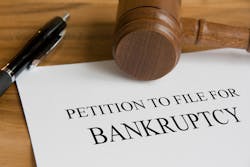Hertz files for bankruptcy following impact of COVID-19
Hertz Global Holdings, Inc., the second-largest U.S. car rental company, has found itself in a financially distressed position due to a halt in the travel industry prompted by the coronavirus pandemic. On May 22, Hertz and some of its U.S. and Canadian subsidiaries filed voluntary petitions for reorganization under Chapter 11 in the U.S. Bankruptcy Court for the District of Delaware.
“The impact of COVID-19 on travel demand was sudden and dramatic, causing an abrupt decline in the company's revenue and future bookings,” the company stated. “Hertz took immediate actions to prioritize the health and safety of employees and customers, eliminate all non-essential spending and preserve liquidity. However, uncertainty remains as to when revenue will return and when the used-car market will fully reopen for sales, which necessitated today's action. The financial reorganization will provide Hertz a path toward a more robust financial structure that best positions the company for the future as it navigates what could be a prolonged travel and overall global economic recovery.”
Hertz's principal international operating regions including Europe, Australia and New Zealand are not included in the bankruptcy proceedings. In addition, Hertz's franchised locations, which are not owned by the company, are not included in the Chapter 11 proceedings.
All of Hertz's businesses globally, including its Hertz, Dollar, Thrifty, Firefly, Hertz Car Sales, and Donlen subsidiaries, are open and serving customers, the company added. All reservations, promotional offers, vouchers, and customer and loyalty programs, including rewards points, are expected to continue as usual.
"Hertz has over a century of industry leadership, and we entered 2020 with strong revenue and earnings momentum," said Hertz President and CEO Paul Stone. "With the severity of the COVID-19 impact on our business, and the uncertainty of when travel and the economy will rebound, we need to take further steps to weather a potentially prolonged recovery. Today's action will protect the value of our business, allow us to continue our operations and serve our customers, and provide the time to put in place a new, stronger financial foundation to move successfully through this pandemic and to better position us for the future. Our loyal customers have made us one of the world's most iconic brands, and we look forward to serving them now and on their future journeys."
As of the filing date, Hertz reported that it had more than $1 billion in cash on hand to support its ongoing operations. Depending upon the length of the COVID-19 crisis and its impact on revenue, the company said it may seek access to additional cash, including through new borrowings, as the reorganization progresses.
When the effects of the crisis began to manifest in March, causing an increase in car rental cancellations and a decline in forward bookings, Hertz stated that it took action to align expenses with significantly lower demand levels by closely managing overhead and operating costs, including:
- Reducing planned fleet levels through vehicle sales and by canceling fleet orders.
- Consolidating off-airport rental locations.
- Deferring capital expenditures and cutting marketing spend.
- Implementing furloughs and layoffs of 20,000 employees, or approximately 50% of its global workforce.
"Hertz is a $25 billion company that is highly leveraged and dependent on significant operating revenue to service its debt and maintain its vehicle rental and leasing business," said Joseph Acosta, a partner at the international law firm Dorsey & Whitney’s bankruptcy practice. During his 21-plus years as a lawyer, Acosta has been involved in some of the largest restructurings, Chapter 11 bankruptcies, and litigation projects in the U.S.
"The coronavirus came at a bad time for Hertz,” Acosta added. “As of the first quarter of 2020, the company was facing $2.5 billion in short term maturities that it believed would be difficult to refinance within the next year. Since Hertz makes most of its money during the spring and summer months, continued stagnation in the travel industry might cause irreversible harm to Hertz’s business.”
"Despite cutting significant costs—to the tune of $2.5 billion—drawing $600 million from its senior credit facility and having approximately $1 billion in liquidity, Hertz was concerned as of the end of the first quarter that the effect of the COVID-19 pandemic on its operations could jeopardize its ability to continue as a going concern for another year," Acosta said.
Acosta added that the asset-based lenders that lease vehicles to Hertz’s U.S. rental car operations (RAC) previously entered into a forbearance of their rights, which caused Hertz to liquidate its fleet of leased vehicles to pay the almost $11 billion in secured debt owed to these lenders. Such liquidation would have a devastating effect on Hertz’s U.S. RAC segment, which generates more than two-thirds of its revenues, he explained.
"If forced into bankruptcy by its asset-based lenders, Hertz may have little choice but to scale down its operations and sell assets to pay down its significant secured debt,” Acosta explained. “Hopefully, the restructuring expenses will not bury the company in the process.”
"Hertz’s bankruptcy might have a significant effect on the automobile retail market because Hertz was a constant purchaser of fleets of new vehicles, creating a demand, and because Hertz’s liquidation of its older line might flood the market with cheaper vehicles," Acosta added.
White & Case LLP is serving as legal advisor for Hertz, Moelis & Co. is serving as investment banker, and FTI Consulting is serving as financial advisor.
About the Author
FleetOwner Staff
Our Editorial Team
Kevin Jones, Editorial Director, Commercial Vehicle Group
Josh Fisher, Editor-in-Chief
Jade Brasher, Senior Editor
Jeremy Wolfe, Editor
Jenna Hume, Digital Editor
Eric Van Egeren, Art Director
